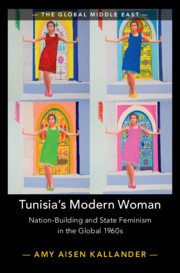Book contents
- Tunisia’s Modern Woman
- The Global Middle East
- Tunisia’s Modern Woman
- Copyright page
- Contents
- Figures
- Acknowledgments
- Note on the Text
- Introduction
- 1 Between State Feminism and Global Sisterhood
- 2 Family Planning as Development
- 3 Postcolonial Tunisian Academics
- 4 Fashion, Consumption, and Modern Gender Roles
- 5 Love and Sex
- Conclusion
- Bibliography
- Index
Introduction
Published online by Cambridge University Press: 20 May 2021
- Tunisia’s Modern Woman
- The Global Middle East
- Tunisia’s Modern Woman
- Copyright page
- Contents
- Figures
- Acknowledgments
- Note on the Text
- Introduction
- 1 Between State Feminism and Global Sisterhood
- 2 Family Planning as Development
- 3 Postcolonial Tunisian Academics
- 4 Fashion, Consumption, and Modern Gender Roles
- 5 Love and Sex
- Conclusion
- Bibliography
- Index
Summary
The introduction frames state feminism within the context of authoritarian state-building in Tunisia as elsewhere in the Middle East as offering opportunities and limitations. Marriage reform and marital metaphors were mobilized by modernizing states across the globe, shaping the public-private divide emblematic of secularism and modern conceptions of the nuclear family. Tunisian family law was part of these processes of juridical reform and modernization that expanded state power over both men and women, appropriating men’s patriarchal control over their families. In postcolonial Tunisia, they were undertaken by a single-party state asserting its authority over the religious establishment, the labor movement, and women’s organizing. Continued ties with France and American financial aid shaped Tunisia’s Cold War alliance, perpetuated its position of dependence, and shaped its economic structures in liberal directions despite a period of ostensible socialism. Women’s rights were important to Tunisia’s international image and secured the middle-class, urban base of the ruling party. Yet by bringing women in proximity to the state through its patronage over women’s affairs, they became public personas involved in politics, diplomacy, and cultural life, shaping the image of modern womanhood along the way.
Keywords
- Type
- Chapter
- Information
- Tunisia's Modern WomanNation-Building and State Feminism in the Global 1960s, pp. 1 - 37Publisher: Cambridge University PressPrint publication year: 2021



